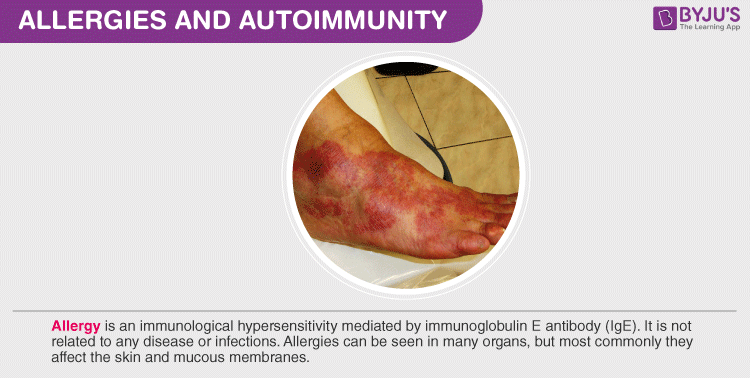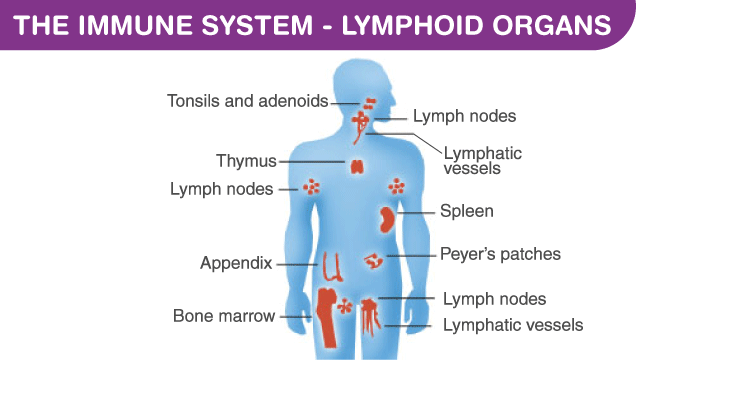Table of Contents
Allergies and autoimmunity are conditions related to the immune system. Allergies are reactions which are brought about when the immune system reacts to foreign substances in the environment. Autoimmunity is a system of responses from the immune system against the body’s healthy cells and tissues.

What is an Allergy?
An allergy is an immunological hypersensitivity mediated by immunoglobulin E antibody (IgE). It is not related to any disease or infections. Allergies can be seen in many organs, but most commonly, they affect the skin and mucous membranes.
Our body is sensitive to specific particles in the environment, and these particles are called allergens. Allergies are mostly a type of antigen that produces an abnormally vigorous immune response.
Certain features of allergies are explained below:
- Common allergens include pollen, dust, feathers, animal dander, mites, latex and even certain types of food.
- The symptoms of allergies typically include sneezing, coughing, running nose, itchy rashes, red eyes, and difficulty in breathing and swallowing.
- Allergies are caused due to the release of chemicals such as histamine and serotonin.
- In response to the allergens, our body produces antibodies called immunoglobulin E antibodies (IgE).
- Antihistamine, adrenaline, and steroids are the few drugs which are given to reduce the symptoms of allergy.
- In severe reactions, adrenaline (epinephrine) is injected into the body.
- An allergy to at least one allergen is widespread throughout the world.
- However, with the modern lifestyle, people are more prone to allergies due to low immunity and high sensitivity to the environment.
What is Autoimmunity?
Autoimmunity is the system of immune responses of an organism against its healthy cells and tissues. A disease which results due to this kind of response is called an autoimmune disease.

The higher vertebrates are capable of recognising foreign antigens. Due to the memory-based acquired immunity, their immune system could very well distinguish between its cells and the foreign organisms. However, due to a genetic condition or some other unknown reason, the body attacks its own cells. The resulting diseases are called autoimmune diseases. The most common example of an autoimmune disease is rheumatoid arthritis (RA). Others are Addison’s disease, Graves’ disease, polymyositis (PM), etc.
Similarities Between Allergies and Autoimmunity
The main similarities between the two are as follows:
- Both symptom results in a general feeling of fatigue and sickness.
- Itching is a common symptom of both allergies and autoimmune diseases.
- Both allergies and autoimmune diseases cause some sort of redness or swelling, due to the higher immune response.
Differences Between Allergies and Autoimmune Disease
The main difference between autoimmune diseases and allergies are summarised in the table as follows:
Allergies |
Autoimmune Disease |
| A condition in which the immune system reacts abnormally to a foreign substance. | An autoimmune disease is a condition in which the immune system mistakenly attacks healthy cells and tissues of the body. |
| The allergies are mainly caused by external triggers such as pollens, certain foods, medicines, insects, animals, etc. | Autoimmune diseases are the results of an internal trigger to the body’s own cells. |
| Examples include skin allergy, sinusitis, asthma, watery eyes, sneezing, and itchy nose and eyes. | Examples include type 1 diabetes, multiple sclerosis, rheumatoid arthritis, inflammatory bowel disease, etc. |
Frequently Asked Questions
1. What is an allergy?
An allergy is an immunological hypersensitivity mediated by immunoglobulin E antibody (IgE). It is not related to any disease or infections.
2. What is autoimmunity?
Autoimmunity is the system of immune responses of an organism against its own healthy cells and tissues.
3. What is an autoimmune disease?
An autoimmune disease is said to be present when the immune system mistakenly attacks the body.
4. What are the types of diseases caused by autoimmunity?
Typically, autoimmunity can involve the following diseases such as rheumatoid arthritis, inflammatory bowel movement and multiple sclerosis
For more detailed information about allergies and autoimmunity, register at BYJU’S.

Comments